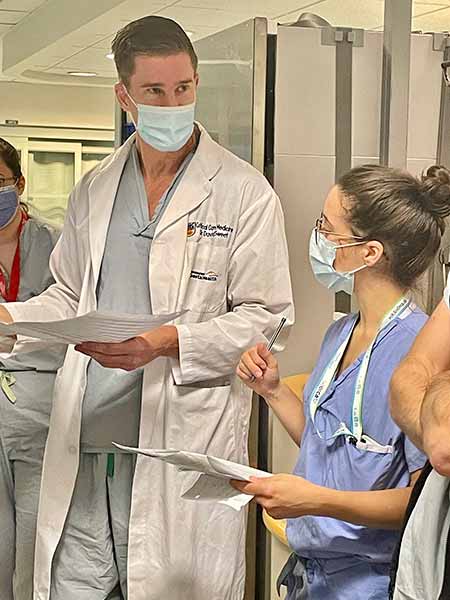Our program is structured to provide trainees with both an outstanding clinical and research environment in which to learn. In what we feel is the best interest of our trainees, we have moved to a blended program, whereby the clinical work is spread over the entire two years, and the research component is adjusted to meet the career goals of the individual trainee. In this system, each trainee will complete thirteen months of adult critical care medicine, shared between the three participating teaching hospitals (Vancouver General Hospital, St Paul’s Hospital & Royal Columbian Hospital), although we may move to include a two month ‘community hospital rotation’ in the coming year. Other core rotations include a month or two months of cardiac critical care (post-cardiac surgical ICU and coronary care) in year 2.
We feel strongly that Critical Care Medicine is a complex discipline, requiring the trainee to acquire a large body of knowledge and skills in a relatively short two-year period. Hence, we do not offer combined training with any other program.
Trainees are identified by their career goals and interests and mentored into one of three tracks.
1. Those interested in ultimately working in a community ICU will be encouraged to use elective time to broaden their clinical skill, and learn administrative skills. Individuals interested in a research career (whether this be basic science or clinical research) will be mentored towards identifying and completing a research project. This is achieved through a one-month preparatory rotation in year 1 during which the trainee will select a supervisor and project, do the necessary background reading and prepare a detailed proposal.
2. In year 2, a research block allows the trainee to complete the project. Individuals choosing this track are required to complete at least one of the following: an abstract, poster, paper, or present at a meeting or “resident’s research day”. Individuals hoping for a more in depth research experience will be encouraged to consider enrolling in the Clinical Investigators Program.
3. The third possible track is for individuals interested in an academic career related to education. These individuals will again be given a one-month rotation in their first year in which to identify a supervisor, and project. Again, they will be expected to do background reading, outline a project with goals suitable to the mentor and Training Committee.
 All residents will also be required to complete a Quality Improvement/Quality Assurance project during their two years of training. Projects and mentors will be identified in the first year of training.
All residents will also be required to complete a Quality Improvement/Quality Assurance project during their two years of training. Projects and mentors will be identified in the first year of training.
The remaining months are available for electives. The content and nature of each elective experience is designed to enhance the competence of the trainee, and must be agreed upon with the Program Director.
In addition to clinical and research work, we run an active academic program. We are constantly striving to improve our trainees experience and learning. Each year in July we start our Academic Half Day. It begins with an 8 – week introductory “core curriculum” primarily for new trainees, although we have found that the senior members of our Program attend these sessions in their second year and find them beneficial. From September through May our Academic Half Day is Thursday afternoon and has a varied format. It includes case based presentations, where a selected resident with the help of a mentor, prepares a case (the topic and objectives are assigned) with questions that are distributed in advance to his/her fellow residents. On the day the case is presented, there is a lively discussion answering questions and reviewing the literature surrounding the preset questions. Over the course of the two years, residents will be exposed to the core concepts of Critical Care Medicine.
In addition to the case-based presentations, there is a seminar series, interspersed with practical sessions following a pre-arranged, two-year rotating schedule so that each trainee completes the full curriculum during his or her time in the program. The other components of the Academic Half Day includes:
- A more informal “interesting” case presentation brought forward in turn from each Hospital, and presented by the trainee concerned,
- Journal Club sessions,
- Research-in-Progress sessions (each trainee is expected to present a research/QI in progress during their 2-year program)
- And sessions devoted to ethics, statistics, obstetrical and pediatric critical care as well as issues surrounding the air transport of critically ill patients.
Critical Care faculty members are assigned to mentor and participate in the Case-Based Presentations, and there is usually good faculty participation during other interactive sessions. As part of the evaluation process, all Academic Half Day sessions are rated and the results of the rating process are returned to the presenter as an encouragement, and an aid to improvement.
Finally, in addition to the above sessions, we require all of the Critical Care residents to be certified in the Advance Trauma Life Support (ATLS) course. Support for these courses comes from the Training Program. At least four times a year residents will be observed (not for evaluation, but for education) managing a scenario with the use of our simulator.
Our Program evaluates trainees both by bedside contact during the clinical rotations, by twice-yearly examinations and by participation in an annual Knowledge Assessment Program in Critical Care Medicine
